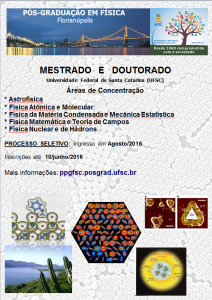
Admission process PPGFSC 2018/2
The Graduate Program in Physics of UFSC makes public the admission process’s notice to the Master and PhD programs entrance at the semester 2 (2º semestre de 20182018/2).
Registration will be made up April 25, 2018 until 5 pm on May 24, 2018, The PPGFSC regards the grade of the Exame Unificado de Pós-Graduações em Física – EUF (Unified Physics Exam) to the entrance at the master and PhD programs.
Click here to access the admission process website of the PPGFSC/UFSC.
THE PHYSICS GRADUATE PROGRAM invites everyone to the seminar:
Síntese de populações estelares em espectros de campo integral de galáxias
Dr. André Luiz de Amorim
Pós-doutorando do PPGFSC/UFSC
Abstract:
Surveys como o MaNGA e o CALIFA têm observado galáxias utilizando espectrógrafos de campo integral. Estes instrumentos permitem obter espectros espacialmente resolvidos dos objetos. Utilizando bibliotecas de espectros sintéticos de populações estelares para modelar estes espectros, é possível vislumbrar o histórico de formação estelar destas galáxias. Também é possível medir propriedades do gás interestelar através das linhas de emissão, removendo a componentes estelar modelada dos espectros. Neste seminário vou apresentar resultados obtidos aplicando estas técnicas aos dados do CALIFA, e alguns resultados preliminares com os dados mais recentes do MaNGA.
Date: April 20, 2018 – (friday) – Place: Sala 212 – Auditório do Departamento de Física – Time: 10h15min
The Graduate Program in Physics of Federal University of Santa Catarina – PPGFSC/UFSC, Florianópolis, announces the vacancy of 2 (two) postdoctoral scholarships from the (Programa Nacional de Pós-doutorado da Coordenação de Aperfeiçoamento de Pessoal de Nível Superior – PNPD/CAPES), to the period of 2 (two) years, it can be renewed annually at a maximum of 60 months.
The monthly amount of the scholarship is R$ 4.100.00 (four thousand one hundred reais) beyond the values destined to assets.
The candidate has to act in THEORETICAL or EXPERIMENTAL research lines at one of the following areas of research: Astrophysics, Atomic and Molecular Physics, Condensed Matter Physics and Statistical Mechanics, Mathematical Physics and Quantum Field Theory and Nuclear Physics and Hadrons.
The complete regulation of the Graduate Program (Programa Nacional de Pós-Doutorado – PNPD) is described at: Portaria nº 086, de 03 de julho de 2013.
To make your application: click here
O Programa de Pós-graduação em Física convida a todos para o mini curso
 Using time resolved optical spectroscopy to understand excited state processes in materials.
Using time resolved optical spectroscopy to understand excited state processes in materials.
Prof. Andy Monkman
Dept. of Physics, Durham University, England.
In this short course, I will describe various time resolved optical spectroscopy techniques and show how they are used to study excited states, excited state migration and energy transfer. Examples of studies in organic materials will be discussed, but the techniques are equally applicable to inorganic materials as well. I shall explain how you can observe non emissive or ‘dark’ states and various delayed emission phenomena. The time domain offers far more information to the spectroscopist than simple steady state measurements especially in differentiating emission or absorption from multiple excited states and energy transfer from one molecule to another, such as in Forster resonance energy transfer. Examples of the use of variable temperature with time resolved optical measurements will demonstrate the full power of optical spectroscopy to explain excited state photophysical properties of materials. Measurements from femtoseconds to seconds and all times in between will be described.
Horário: 16, 17 e 18 de abril, das 10 – 12 h.
Local: Auditório do Departamento de Química – UFSC.
OBS: Os participantes podem solicitar certificado.









